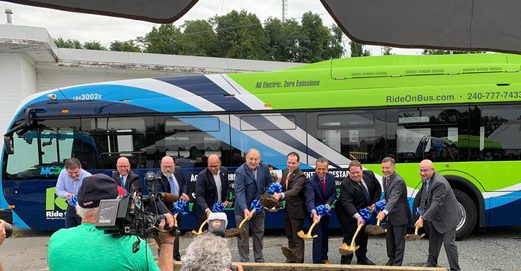Clean and Resilient Buses in Brookville: MEA Helps County Meet Energy Goals
Agency Issues $300,000 Grant for Microgrid at Brookville Bus Depot
Brookville, MD – The Maryland Energy Administration (MEA) is leading the way once again in clean energy innovation. The groundbreaking for a microgrid to power the Brookville Bus Depot fleet took place on Thursday, September 2, 2021 as part of a goal to achieve net-zero greenhouse gas emissions by 2035. Solar PV, distributed natural gas-fueled generation, battery energy storage, and electric vehicle charging equipment will comprise the 5.6 MW microgrid that will power an initial fleet of 44 buses as the fleet is transitioned from diesel to electric. The microgrid’s innovation lies in its flexibility; the microgrid will be able to provide two-way grid services, allowing electricity to flow both into and out of the microgrid based upon the energy needs of the bus depot and the grid. MEA provided the County with a $300,000 grant from its Public Facility Solar Grant Program to help fund the nearly 1.7 megawatts of solar PV canopies that will be constructed over the bus parking areas. They will help provide clean energy to the buses while improving resiliency by expanding options for powering the buses during power outages.
“This project really is innovative across the board,” said Mary Beth Tung, Director of MEA, “The county’s innovative project, which we are glad to be part of, is an example of how P3s combined with public funds can help overcome investment challenges to highly impactful projects.”
The County is partnering with AlphaStruxure (a joint venture between the Carlyle Group and Schneider Electric) to implement the Brookville Smart Bus Depot microgrid under a public-private partnership, or “P3.”
MEA attended the groundbreaking ceremony along with many other key project stakeholders and supporters. Representatives from the Maryland General Assembly including Delegate Alfred Carr, Delegate Jared Solomon, and Delegate David Fraser-Hidalgo were present as well as Montgomery County Councilmember Evan Glass. Also in attendance were representatives from the Montgomery County Department of Transportation, the County Executive’s Office, P3 project partner and developer AlphaStruxure, Pepco Holdings Incorporated and others. The remarks given underscored the importance of a teamed approach and what it takes to turn design drawings into working systems.
The Brookville Smart Bus Depot microgrid is only the latest in a series of clean energy, energy efficiency, and resiliency projects that Montgomery County has undertaken to meet its energy and sustainability goals. Among the County’s projects receiving MEA funds include the Public Safety Headquarters microgrid; the Boyds, MD correctional facility microgrid; the Martin Luther King, Jr. Swim Center combined heat and power or “CHP” system; efficiency upgrades at its Rockville Executive Office Building; conversion of its public safety vehicles to electric; data center optimization upgrades for its school system; a resiliency hub at its Scotland Drive Community Center; and a potential community-scale microgrid to serve a collection of critical county buildings that compose its “Rockville Core.” Together, MEA has awarded nearly $2 million from the Strategic Energy Investment Fund (SEIF) in support of these endeavors at county facilities and operations. In sum, the SEIF has awarded over $17 million in projects in Montgomery County Facilities and the overall community since 2016.
“This is exactly why we do what we do,” said Eric Coffman, MEA’s Division Director of Energy Programs, “We’re the administrators of the Strategic Energy Investment Fund,and through that fund we are delighted to issue a grant to help support the solar panel portion of this project.”
AlphaStruxure will design, install, own, and maintain the microgrid, as well as provide the bus depot with the energy it produces under a service agreement. This arrangement will allow the county to avoid immediate budget impacts, and upfront costs are nearly eliminated. In addition, maintenance elements are included along with specialized technical expertise. This model is known as “Energy-as-a-Service,” or “EaaS,” and is gaining popularity among public and private organizations as they move forward on their energy and sustainability goals. The county has also selected the EaaS model on some of the other projects discussed above.
Clean, resilient, and efficient energy projects like those implemented across the county and the State are our agency’s mission in action: promoting affordable, reliable, and cleaner energy for Maryland. They are also important proofs-of-concept, demonstrating how comprehensive energy projects that incorporate clean generation, efficient energy use, resilient enhancements, and smart control systems will be essential to modernizing our grid and improving societal access to affordable and sustainable energy solutions.
To learn more about MEA, its mission, and the incentives it provides, visit us at www.Energy.Maryland.gov and follow us on social media: Facebook | Twitter | LinkedIn


 1-888-373-7888
1-888-373-7888 233733
233733